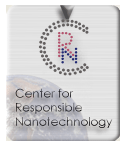














When a distinguished but elderly scientist states that something is possible, he is almost certainly right. When he states that something is impossible, he is very probably wrong."
— Arthur C. Clarke
Like any powerful technology, nanotechnology has potential for both benefit and harm. We believe that a stance of cautious optimism is called for. Caution demands that we understand the capabilities of advanced nanotechnology before it arrives, and work to prepare for the changes it will bring. The Center for Responsible Nanotechnology, an independent non-profit organization, was formed for this purpose.
NOTE: These positions were originally published by CRN in early 2003. See an appraisal and update from January 2008 update here.
The following six statements summarize CRN's foundational positions:
- Effective use of nanotechnology can benefit everyone.
- Unwise use of nanotechnology can be very dangerous.
- Nanofactory technology can be used safely.
- Preventing nanotechnology is impossible; careful study will be necessary for wise use.
- Effective use of nanotechnology will require intelligent and prudent policy-making.
- The situation is urgent; nanofactories may be developed within a decade.
Effective use of nanotechnology can benefit everyone.
Advanced nanotechnology promises the ability to build precise machines and components of molecular size. Using mechanically guided chemistry, rapid prototyping, and automated assembly, a nanofactory could combine components into large and complex products. A personal nanofactory should be able to provide cheap, clean, rapid manufacturing; the resulting abundance has the potential to alleviate most shortages, and enable a high standard of living for everyone who has access to it. Rapid, cheap, flexible manufacturing will allow swift development of new inventions, spurring innovation and creating further benefits. We are dedicated to the principle of making these benefits available as widely as possible through effective administration of molecular manufacturing.
Unwise use of nanotechnology can be very dangerous.
A technology this powerful could easily be misused. The rapid development cycle and massive manufacturing capability may lead to an unstable arms race between competing powers. Excessive restrictions may lead to an inhumane gap between rich and poor, and may encourage a black market in bootleg, unsafe molecular manufacturing technology. Insufficient restrictions may allow small groups and even individuals to produce undesirable products or terrorist tools. The products of a nanofactory could have unprecedented power and efficiency. Some restrictions, implemented worldwide, will probably be necessary for sufficient control of the use of molecular manufacturing.
Nanofactory technology can be used safely.
The manufacturing capability of advanced nanotechnology might be encapsulated in a device of convenient size, with built-in mechanisms for restricting the products it can make. A box the size of a microwave oven would provide ample manufacturing capacity for a household; such a format would be suitable for private ownership, and is easily large enough to contain all necessary functionality for safe use, including elimination of any chemical emissions, and various security technologies. The security features would ensure that the factory would only make approved products; several approval processes could be instituted for the use of various groups and situations. By using nanofactories with built-in restrictions, necessary control could be imposed while allowing widespread use of molecular manufacturing.
Preventing nanotechnology is impossible; careful study will be necessary for wise use.
Many nations around the world have already established nanotechnology programs, spending hundreds of millions of dollars per year. Many enabling technologies are developing rapidly. There is no realistic way to relinquish or prevent all development that could lead to robust molecular manufacturing, and there are compelling military and economic reasons for its development—in many different countries. Meanwhile, estimates of the technology's ultimate potential, and the timeline and cost for development, vary widely. Information is power; only through intensive studies can we ensure that the developers and the future administrators of this powerful capability have the tools they need to make the right decisions. A detailed understanding of molecular manufacturing technology is necessary to prepare for its eventual development.
Effective use of nanotechnology will require intelligent and prudent policy-making.
Like a computer, a nanotechnology manufacturing system could be incredibly flexible—useful for a wide range of tasks. The administration of a single technology with a multitude of uses, many of them dangerous, poses a unique problem. No single organization can effectively tackle this problem. A single point of control will not be responsive enough to choose the correct set of restrictions for every case, when decisions must be made rapidly and too much restriction may be as bad as too little; however, some worldwide control will probably be necessary. An organization with a single focus, such as military or commercial, cannot make good decisions about unrelated purposes; an organization that tries to accommodate everyone will probably make unwise compromises. Predicting the effects of any choice will require a detailed understanding of the potential of the technology. Well-informed policy must be set, and administrative institutions carefully designed and established, before molecular manufacturing is developed.
The situation is urgent; nanofactories may be developed within a decade.
Development of molecular manufacturing technology will rapidly become easier. Computer chips have parts only 120 atoms wide, and getting smaller; molecules bigger than that have already been constructed. Several technologies allow direct creation of complex structures less than 20 atoms wide, and single-atom lithography is being developed. Automated assembly has been used for decades; rapid prototyping is quickly developing from industrial to home use. Molecular manufacturing and assembly will be simpler and easier in many ways than normal manufacturing. Rapid development programs, some of which may be secret, competitive, and unregulated, will be driven by powerful economic and military incentives. To be prepared for the coming development of molecular manufacturing technology, we must start planning for it immediately.
Inform your communities


Home | About Us | Donate | FAQ | Nano Tomorrows | CRN Blog | Site Map | Contact CRN
Last updated on